| | A first-ever malaria treatment for babies will be rolled out in African soon, the US offers the EU a͏ ͏ ͏ ͏ ͏ ͏ |
| |   Paramaribo Paramaribo |   Lagos Lagos |   Cincinnati Cincinnati |
 | Flagship |  |
| |
|
The World Today | 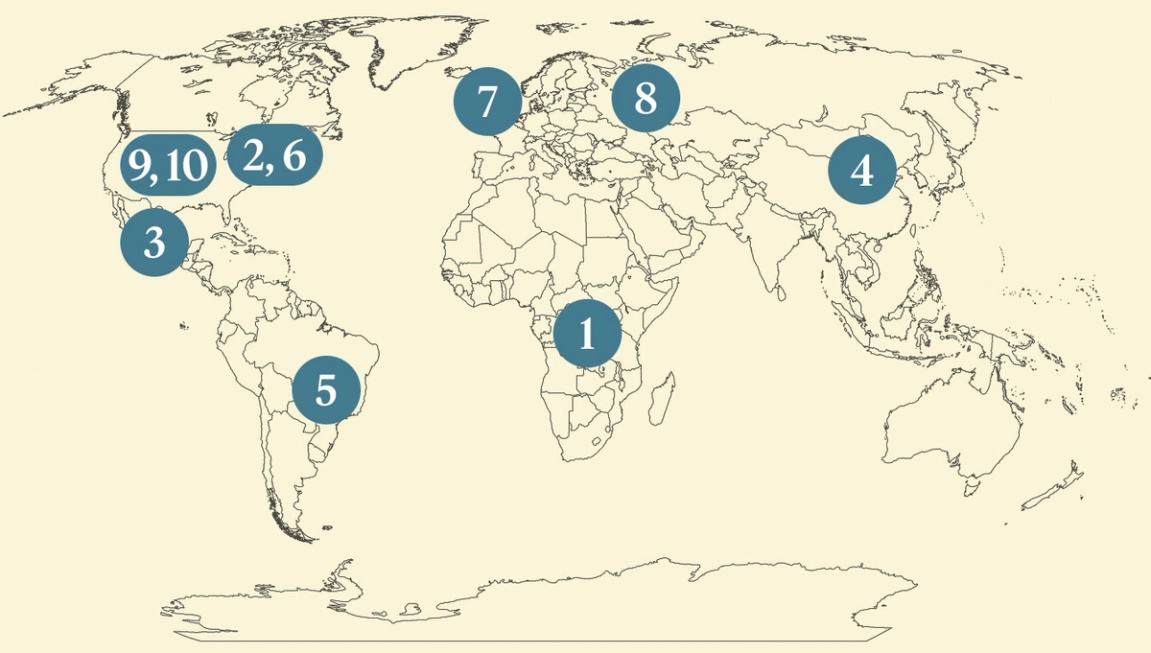 - Malaria drug for babies
- US offers EU deal
- Mexico’s US tariff pivot
- China economic warnings
- Lula hits out at Trump
- Bibi backs Trump for Nobel
- Macron’s UK state visit
- Russian minister death
- Shoes on at airports
- US measles cases up
 Suriname’s first female president-elect, and Ozzy Osbourne’s final gig (he means it this time). |
|
New malaria treatment for babies |
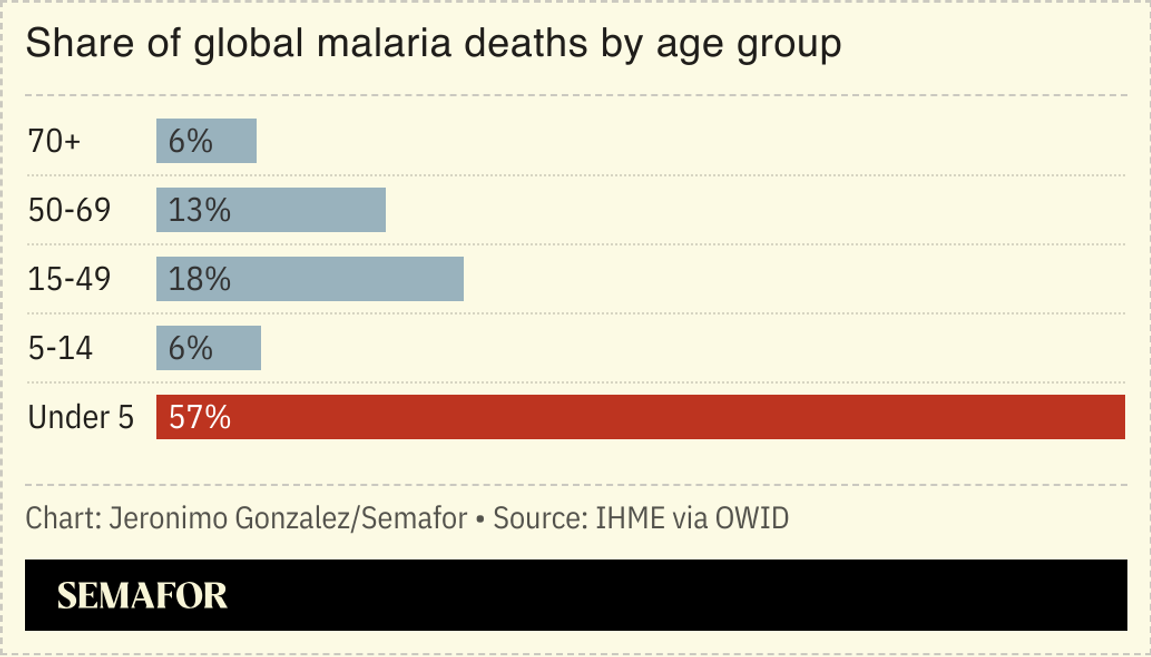 The first ever malaria treatment for babies will be rolled out in Africa soon. Roughly 600,000 people die of malaria every year, the large majority of them African children. Treatments exist, but are unsuitable for the very young because of the risk of overdose. The new medicine, which can be given in milk, is a soluble form of existing treatments: The youngest patient in a recent trial was just one day old. Nine African countries are expected to approve the medicine within months. Recent years have seen significant progress in the battle against malaria: The World Health Organization approved two vaccines in 2021 and 2023, and scientists hope that gene-editing mosquitoes could help eradicate the disease. |
|
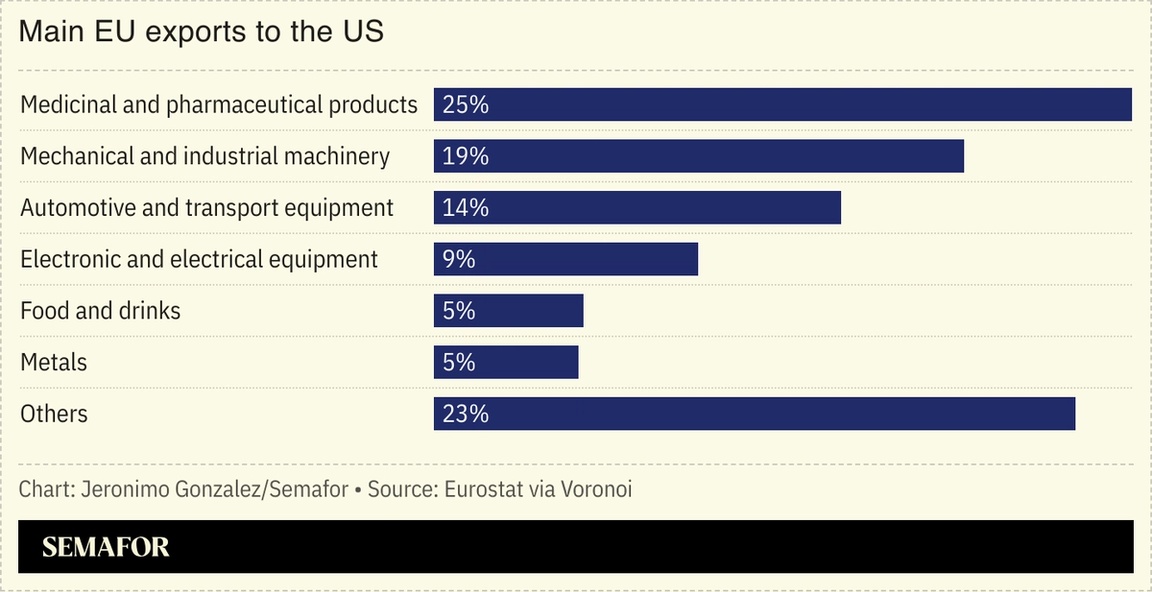 Washington reportedly offered Brussels a relatively benign trade deal, helping calm markets worried by fresh White House tariff threats. The agreement would largely leave American import duties at 10%, Politico said, lower than US President Donald Trump’s “Liberation Day” tariffs. Still, European officials cautioned that any agreement would only be preliminary, and from their perspective amounts to damage mitigation because duties would be higher than prior to Trump’s ascension. Analysts, meanwhile, were skeptical about Trump’s letters outlining new duties for 12 countries effective Aug. 1: “I don’t even know if anybody understands the difference between what was announced today, what was there previously, and if it will actually be implemented,” one told CNBC. |
|
Mexico pivots over US tariffs |
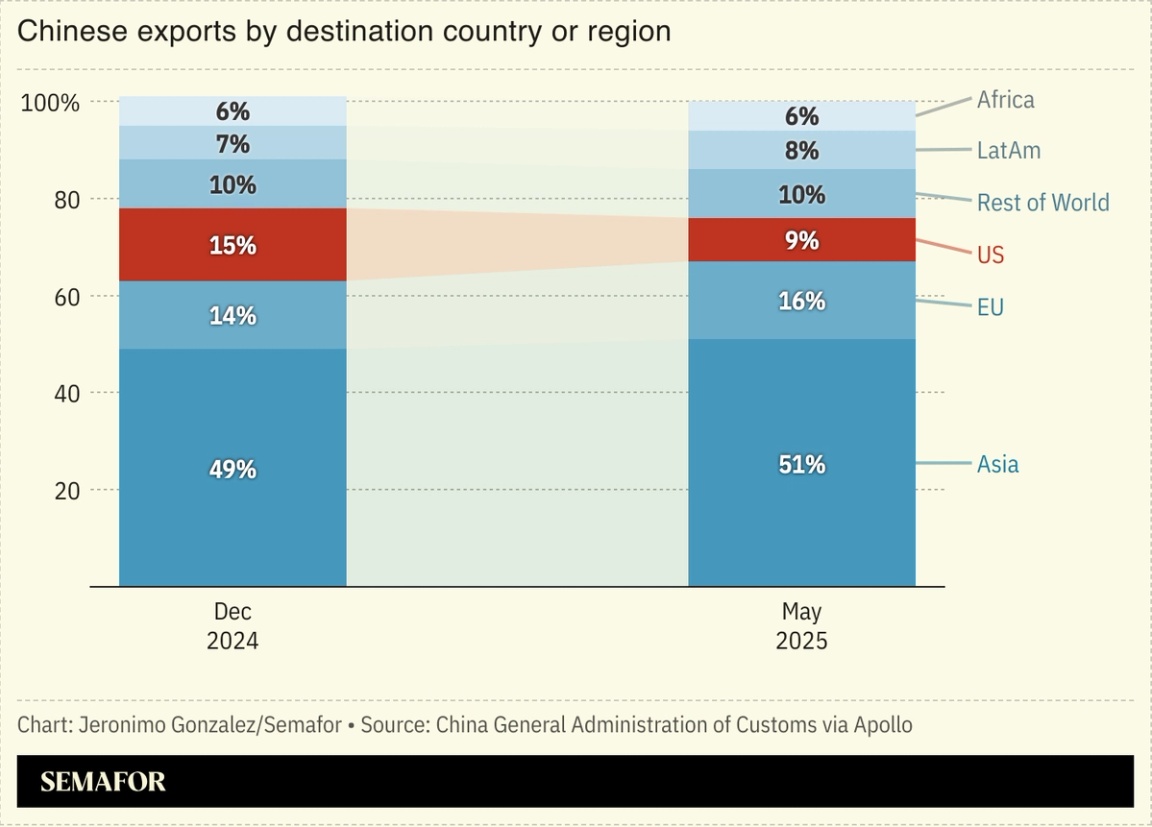 Mexican manufacturers are racing to adapt to Washington’s protectionism, with many bringing entire supply chains in-country to reduce reliance on Chinese imports. Car and appliance makers in Mexico have long assembled final products for sale in the US using Asian-made components. However, many no longer see the imports as a safe bet, forcing companies across the country — which sends 80% of its exports to the US — to onshore their processes: “The game has changed,” an expert told The New York Times. Washington’s tariffs have also forced Beijing to divert trade to other regions, with exports to the European Union, Asia, and other Latin American countries increasing in the last six months, Apollo’s chief economist noted. |
|
Chinese experts sound alarm |
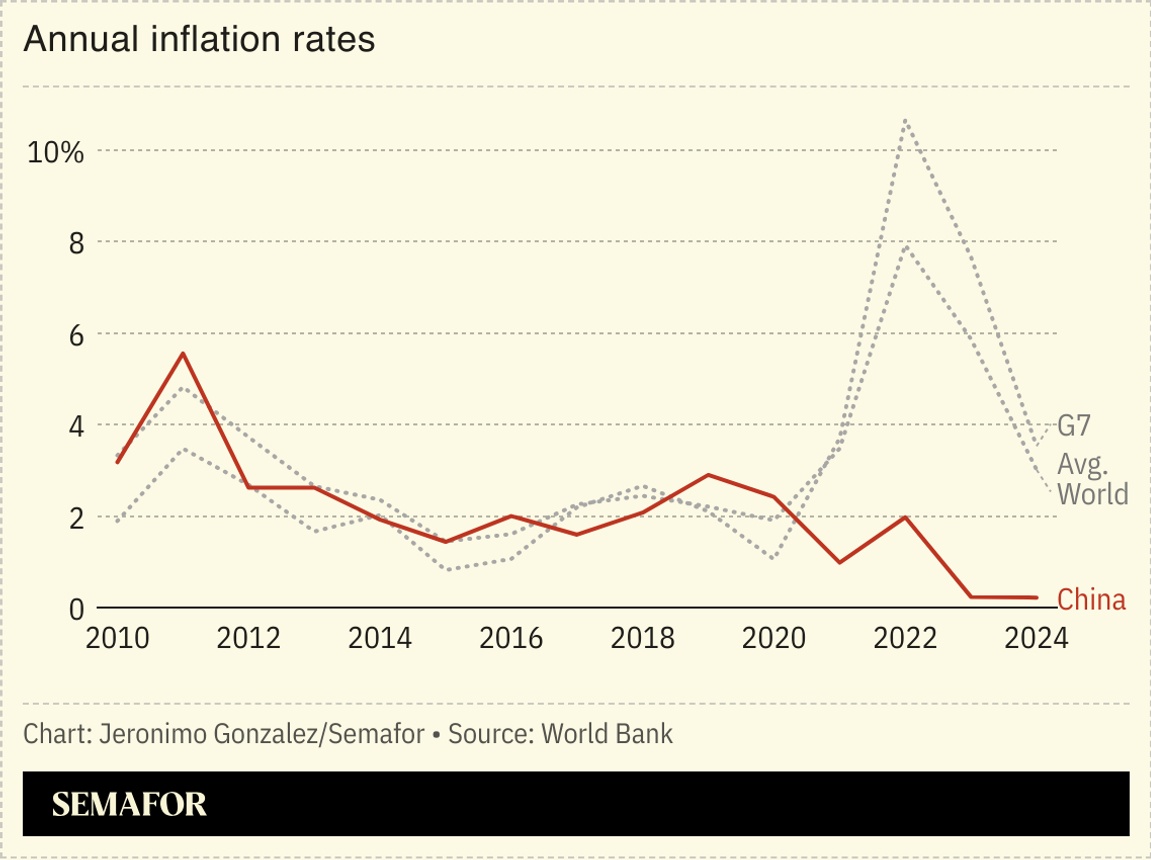 Prominent Chinese experts sounded the alarm over the serious threats facing the world’s second-biggest economy. Beijing’s trade war with Washington has dominated attention, and Chinese officials previously downplayed the myriad long-term risks to growth, making the latest warnings notable. A leading Communist Party journal recently cautioned against “overcapacity” — a term Beijing once fiercely contested — while an influential economic adviser joined a growing number of voices saying China must guard against involution, or economically destructive price wars. Meanwhile Caixin, the highly regarded business magazine, reported that China’s debt-laden property developers are imposing steep haircuts on creditors to avert bankruptcy, creating “a perilous new chapter” in the country’s real estate crisis. |
|
Lula dismisses Trump ‘interference’ |
 Ricardo Moraes/Reuters Ricardo Moraes/ReutersBrazilian President Luiz Inácio Lula da Silva hit back at his US counterpart Donald Trump for saying Lula’s predecessor, far-right leader Jair Bolsonaro, was the victim of a witch hunt. Trump had called on Brazilian authorities to halt Bolsonaro’s prosecution over an alleged coup attempt, remarks that Lula dismissed as “interference.” The Brazilian leader — who this weekend hosted a summit of the BRICS bloc of mostly developing nations — also said the world “doesn’t want an emperor,” after Trump threatened new, additional tariffs on countries aligned with the group. In response to fraying ties with Washington, Brasília has sought closer relations with Beijing, a move that could hurt Lula’s popularity further: 75% of Brazilians distrust China, a recent poll showed. |
|
 Kevin Lamarque/Reuters Kevin Lamarque/ReutersIsraeli Prime Minister Benjamin Netanyahu nominated US President Donald Trump for a Nobel Peace Prize, even as reports underlined the hurdles to lasting calm in the Middle East. On a trip to Washington, Netanyahu said Trump was “forging peace… in one region after another,” speaking as Israel and Hamas neared a truce over the war in Gaza. Yet the two sides still disagree on key issues, and prior ceasefire talks have stumbled at later stages. A relative quiet between Israel and Iran also appeared at risk following their recent war: Tehran’s president said that Israel had sought to assassinate him, while Axios reported that Israeli officials believe they have Washington’s green light to strike Iran again if they deem necessary. |
|
Macron in UK on state visit |
 Chris Jackson/Reuters Chris Jackson/ReutersFrench President Emmanuel Macron arrives in the UK today, the first state visit by a European Union leader to Britain since Brexit. Relations between London and Paris were frosty for years after Britain voted to leave the union, but have — like Britain’s ties with the rest of the continent — begun to thaw. Macron and British Prime Minister Keir Starmer have a lot to discuss: Starmer is under pressure over migrants crossing the English Channel, a flow he hopes France will help curb, and the leaders of Europe’s only nuclear-armed powers are both keen to support Ukraine as the US retreats. One expert told The Guardian that France “had a hard time swallowing” Brexit but has “finally digested [it].” |
|
 Smart coverage of power and ideas. Check out The Observer for the very best of their investigations, interviews, reviews, and reporting – curated daily by the newsroom’s editors. Sign up for free. |
|
 Sputnik/Gavriil Grigorov/Reuters Sputnik/Gavriil Grigorov/ReutersRussia’s transport minister died of a gunshot wound hours after being fired from his role, one of a series of deaths among people out of favor with President Vladimir Putin. Officials described Roman Starovoit’s death as a likely suicide. He had been investigated for corruption, and, in his former role as the governor of the Kursk region, was blamed for security failings ahead of a Ukrainian incursion. Another transport ministry official died, apparently of heart failure, the same day. Life in Moscow’s upper echelons is risky: At least nine high-profile people have fallen from windows since 2022, while a further 65 have had accidents or unexpected heart attacks, and one even shot himself five times in the chest. |
|
 Wikimedia Creative Commons photo/David Benbennick/CC BY-SA 3.0 Wikimedia Creative Commons photo/David Benbennick/CC BY-SA 3.0Passengers at some US airports no longer have to remove their shoes at security. Eight airports in different states appeared to have dropped the requirement, in place since 2006 after a British man in 2001 attempted to destroy an airliner with explosives hidden in a shoe. Other Global War on Terror-era security measures may also be slowly winding down: Several European airports have relaxed the rule limiting carry-on liquids to 100 ml (3.4 oz), thanks to improved scanning techniques. The news counters the usual trend of security measures endlessly ratcheting up, because it is politically difficult to reduce them, as the security expert Bruce Schneier has written. |
|
|